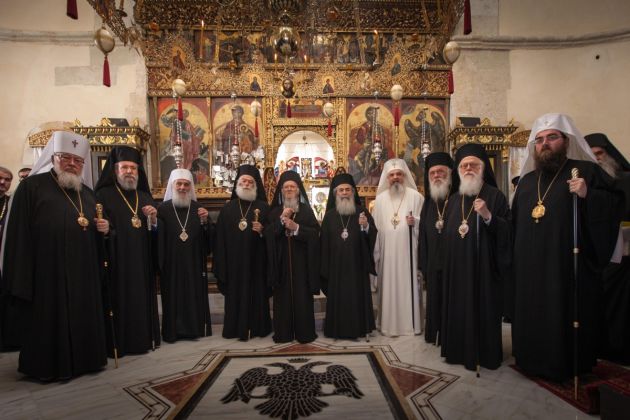Orthodox church leaders urge Mideast Christians' protection; warn of genetics' experimentation

Orthodox church leaders from around the world have expressed their concern about the persecution Christians and other religious minorities are facing in the Middle East.
Their June 26 message came as they concluded a historic meeting of Orthodox church leaders on the island of Crete in Greece, the first of its kind in 1,200 years.
At the end of the week-long Orthodox Holy and Great Council the church leaders said, "The Orthodox Church is particularly concerned about the situation facing Christians and other persecuted ethnic and religious minorities in the Middle East."
The church "addresses an appeal to governments in that region to protect the Christian populations - Orthodox, Ancient Eastern and other Christians - who have survived in the cradle of Christianity," they noted.
"The proposal was made for the Holy and Great Council to become a regular Institution to be convened every seven or ten years," the 10 church leaders said in their joint message.
However, it is unlikely that churches which did not attend the historic gathering will comply with any decision taken there as there is no centralized authority for Orthodox churches, unlike that for the Roman Catholic Church which has the Holy See at the Vatican.
The Russian Orthodox Patriarch Kirill, who represents more than 100 million Orthodox Christians, refused to attend the meeting, asserting that there were insufficient preparations.
ECUMENICAL PATRIARCHATE
Based in Istanbul in mainly Muslim Turkey, the Ecumenical Patriarchate, is frequently at odds with the Russian Church, The Associated Press reported .
Aside from Russia, the Orthodox churches of Bulgaria and Georgia were absent. The Syria-based Antioch patriarchate also stayed away.
There are 14 such autocephalous or autonomous churches worldwide, with the Ecumenical Patriarch Bartholomew I of Constantinople, considered as their spiritual head or the "first among equals."
The Russian Orthodox Church has the biggest number of followers of all the Orthodox churches.
At the historic council, the church leaders also voiced concern over the "negative consequences of scientific progress" and "moral dilemmas" caused by rapid advances in genetics and biotechnology.
"Man is experimenting ever more intensively with his own very nature in an extreme and dangerous way. He is in danger of being turned into a biological machine, into an impersonal social unit or into a mechanical device of controlled thought," the council leaders stated.
Among issues discussed in the Holy and Great Council, were: the Mission of the Orthodox Church in the modern world; the Orthodox Diaspora and the operational regulations of the Episcopal Assemblies; the autonomy and the way for proclaiming it, the importance of fasting and its compliance today, the Sacrament of matrimony and its impediments; and the relations of the Orthodox Church with the rest of the Christian world.
On the "contemporary crisis in marriage and the family," the council said it is "a consequence of the crisis of freedom as responsibility, its decline into a self-centered self-realisation, its identification with individual self-gratification, self-sufficiency and autonomy, and the loss of the sacramental character of the union between man and woman, resulting from forgetfulness of the sacrificial ethos of love."
It says that rather than just being a contractual relationship, it is "a Church-nurtured workshop of life in love and an unsurpassed gift of God's grace."